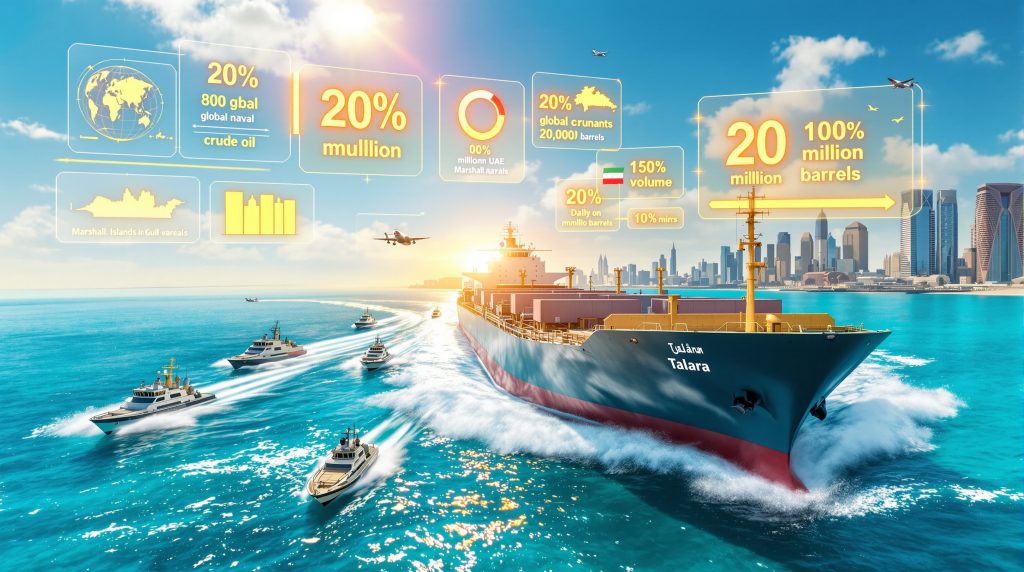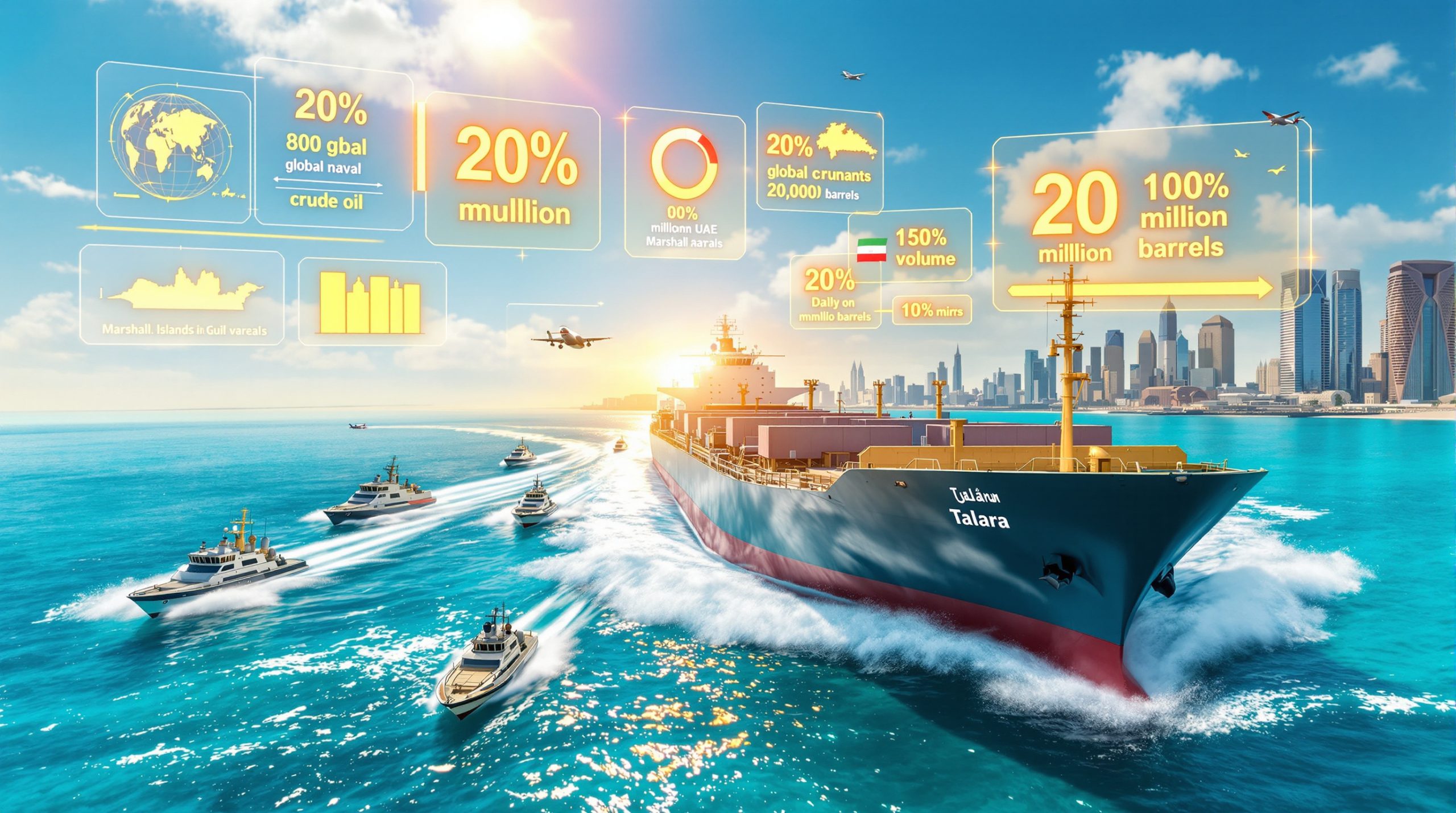Strategic Context Behind Maritime Seizures
The Gulf of Oman has become a focal point for regional tensions as Iran seizes oil tanker incidents continue to influence energy security and international shipping through one of the world's most critical waterways. This maritime incident in November 2025 extends beyond a single event, reflecting complex geopolitical dynamics that shape modern energy markets.
Maritime seizures in this region serve multiple strategic purposes, from diplomatic signalling to economic leverage. The frequency and timing of such incidents often correlate with broader regional conflicts and international sanctions regimes. Iran's naval capabilities in the Gulf have expanded significantly over the past decade, enabling more sophisticated maritime operations that can disrupt commercial shipping whilst maintaining plausible deniability.
The strategic importance of controlling shipping lanes cannot be overstated. Nations that can influence maritime traffic through chokepoints gain considerable leverage over global energy markets and international commerce. This dynamic has intensified as regional powers compete for influence amid shifting alliances and economic pressures.
Details of the Tanker Interception
The Marshall Islands-flagged vessel Talara was conducting routine commercial operations when Iranian Revolutionary Guard Corps naval units approached approximately 20 nautical miles off the UAE coastline. The interception unfolded as the tanker moved through international waters after departing from Ajman, UAE, with Singapore as its planned destination.
Timeline of Critical Events:
- Initial Departure: Vessel left Ajman port carrying high-sulfur gasoil cargo
- Naval Approach: Three small Iranian naval craft intercepted the tanker
- Boarding Operation: IRGC forces boarded and assumed operational control
- Course Diversion: Ship was redirected toward Iranian territorial waters
- International Monitoring: U.S. Navy surveillance assets tracked the incident over several hours
The Cyprus-based Columbia Shipmanagement company, responsible for vessel operations, reported losing communication with the crew and activated emergency protocols to restore contact. The company's response highlighted the vulnerability of commercial shipping in contested waters and the challenges operators face when vessels are seized by state actors.
Communication blackouts during such incidents are standard procedure for intercepting forces, creating uncertainty about crew safety and cargo status. This information vacuum complicates diplomatic responses and can escalate tensions as affected parties operate with limited intelligence about the situation.
Geographic Significance for Global Energy Markets
The Gulf of Oman and the adjacent Strait of Hormuz represent the world's most strategically important energy transit corridor. Understanding this geographic and economic significance explains why maritime incidents here generate immediate international attention and oil price movements.
Critical Energy Transit Statistics:
| Transit Metric | Daily Volume | Global Percentage |
|---|---|---|
| Crude Oil Shipments | 18-20 million barrels | 18-20% of global trade |
| Natural Gas Shipments | 2-3 billion cubic feet | 8-10% of global LNG |
| Total Energy Value | $1.2-1.5 billion | Significant economic impact |
Alternative routing options remain extremely limited, with most requiring significantly longer transit times and higher costs. The Cape of Good Hope route around Africa adds approximately 6,000 nautical miles to Middle East-Europe shipments, substantially increasing transportation costs and delivery times.
Regional refinery capacity and strategic petroleum reserves provide some buffer against short-term disruptions. However, prolonged interference with shipping can trigger supply shortages and price volatility across global markets. The interconnected nature of energy supply chains means that disruptions in this region ripple through international markets within hours.
Historical Patterns of Maritime Incidents
This seizure represents the first major tanker interception by Iranian forces since April 2024, but fits within established patterns of maritime enforcement that have intensified during periods of regional conflict. Furthermore, these incidents demonstrate how maritime enforcement has evolved from opportunistic seizures to calculated operations.
Evolution of Maritime Incidents:
| Period | Incident Frequency | Strategic Context |
|---|---|---|
| 2019-2020 | 8-12 major incidents | Peak U.S. sanctions pressure |
| 2021-2023 | 3-5 incidents annually | Diplomatic negotiation periods |
| 2024-2025 | Increasing frequency | Regional conflict escalation |
Iranian maritime enforcement has evolved from opportunistic seizures to more calculated operations targeting specific vessel types or flags. The pattern suggests coordination with broader foreign policy objectives, using maritime incidents as tools for diplomatic leverage and regional power projection.
The timing of seizures often coincides with international diplomatic initiatives, sanctions announcements, or regional security developments. This correlation indicates that maritime enforcement serves as both a response mechanism to international pressure and a proactive tool for influencing regional dynamics.
In addition, analysis of previous incidents reveals that vessel nationality, cargo type, and operational patterns influence targeting decisions. Tankers carrying refined products or operating under certain flag registrations appear to face higher interception risks during periods of elevated tension.
International Maritime Law Applications
The seizure occurred in waters where jurisdictional boundaries create complex legal frameworks. The UK Maritime Trade Operations classified the incident as probable state activity, recognising Iranian governmental involvement rather than private maritime crime.
Legal Framework Considerations:
- International Waters Status: Seizure location beyond clear Iranian territorial claims raises jurisdictional questions
- Flag State Rights: Marshall Islands registration provides specific legal protections under international law
- Commercial Shipping Laws: Vessel engaged in legitimate international trade under established maritime conventions
- Enforcement Justification: Iran's stated legal basis for the seizure remains unclear or unpublished
The United Nations Convention on the Law of the Sea provides the primary legal framework governing such incidents. However, enforcement mechanisms remain limited when state actors are involved. Flag states can pursue diplomatic remedies, but practical recourse options are constrained by geopolitical realities.
Maritime insurance frameworks typically classify state seizures differently from piracy, affecting coverage and compensation mechanisms. This distinction influences shipping company risk assessments and route planning decisions for future operations in contested waters.
International shipping organisations have developed enhanced reporting protocols for maritime security incidents. Nonetheless, these measures provide limited protection against state-sponsored enforcement actions. The gap between international law and practical enforcement capabilities continues to challenge commercial maritime operations.
Economic Market Implications
Maritime security incidents in the Gulf region generate swift market responses due to the concentrated nature of global energy transit through these waters. The complexity of OPEC production impact and regional supply chains means that even temporary disruptions can trigger significant price movements.
Immediate Economic Impact Factors:
- Supply Chain Disruption: Potential delays affecting energy shipments to major consuming regions
- Insurance Premium Increases: Higher costs for vessels transiting high-risk maritime zones
- Alternative Route Economics: Elevated transportation expenses via longer shipping lanes
- Inventory Management: Refineries adjusting procurement strategies to maintain operational flexibility
Maritime security incidents create ripple effects throughout global energy markets, with price volatility often exceeding the actual physical impact of supply disruptions due to market psychology and risk premium calculations.
Energy traders monitor maritime security developments closely, as incidents can trigger automated trading responses and speculative position adjustments. The speed of modern financial markets means that maritime incidents can influence energy prices within minutes of initial reports.
Regional price differentials often widen during maritime security incidents, as spot markets price in elevated transportation risks and potential supply disruptions. Consequently, this dynamic affects regional refinery economics and consumer energy costs across multiple markets.
International Response Coordination
The international response reflects broader geopolitical tensions characterising Middle Eastern maritime security. Various stakeholders maintain distinct interests in either preserving or challenging the current balance of maritime power in the region.
Stakeholder Response Framework:
- United States: Enhanced naval surveillance operations and diplomatic pressure through established channels
- European Union: Coordinated calls for de-escalation whilst emphasising maritime law compliance
- Regional Maritime Allies: Increased coordination on shipping security measures and information sharing
- Commercial Shipping Operators: Accelerated risk assessment procedures and adjusted route planning protocols
Naval coordination between allied nations has intensified following recent incidents, with enhanced information sharing and coordinated patrol operations. However, the effectiveness of these measures remains limited by the legal complexities of operating in contested waters.
Diplomatic channels remain active despite public tensions, with back-channel communications often proving more effective than formal protest mechanisms. The complexity of maritime law and jurisdictional boundaries requires sustained diplomatic engagement to prevent escalation.
Commercial maritime organisations have developed enhanced communication protocols and security procedures. Nevertheless, these measures provide limited protection against state-sponsored enforcement actions. Industry adaptation focuses primarily on risk management and operational planning rather than prevention.
What Are the Operational Adaptations for Future Shipping?
The incident highlights persistent vulnerabilities in critical energy supply chains and emphasises the need for comprehensive risk management strategies addressing both operational and geopolitical factors. The growing importance of market volatility hedging has become evident as shipping companies adapt to increased risks.
Commercial Shipping Adaptations:
- Enhanced Security Protocols: Advanced vessel tracking systems and improved crew communication capabilities
- Route Diversification Strategies: Development of alternative shipping corridors and flexible operational planning
- International Naval Cooperation: Strengthened coordination between commercial operators and military escort services
- Insurance and Risk Management: Adjusted coverage frameworks for high-risk maritime transit zones
Shipping companies have invested significantly in satellite communication systems and real-time vessel monitoring to maintain contact with vessels transiting contested waters. These technologies provide enhanced situational awareness but cannot prevent determined state-sponsored interception efforts.
Alternative routing strategies require careful economic analysis, as longer routes substantially increase operational costs and delivery times. Some operators have developed flexible routing protocols that can be activated during periods of elevated maritime security risks.
The maritime insurance industry continues to evolve coverage frameworks for political risk and state-sponsored seizures. Premium structures increasingly reflect specific route risks and vessel operational profiles, affecting overall shipping economics.
Prevention Strategies and Frameworks
Preventing future maritime seizures requires addressing both immediate security concerns and underlying geopolitical tensions that motivate such enforcement actions. For instance, understanding trade war impacts helps contextualise broader regional tensions affecting maritime security.
Multi-Layered Prevention Approach:
- Diplomatic Engagement: Sustained dialogue addressing underlying regional tensions and competing interests
- International Monitoring Systems: Enhanced surveillance capabilities and coordinated incident reporting
- Commercial Security Measures: Improved vessel protection and crisis response procedures
- Legal Framework Strengthening: Reinforced enforcement mechanisms for international maritime law
Effective maritime security requires balancing commercial navigation freedom with legitimate regional security concerns through sustained diplomatic engagement and operational coordination.
Regional security frameworks have evolved to include maritime components, but implementation remains challenging due to competing national interests and jurisdictional complexities. Multilateral approaches show more promise than bilateral arrangements for addressing systemic maritime security challenges.
Commercial industry initiatives focus on information sharing and coordinated response procedures. However, they cannot address the underlying political dynamics that drive state-sponsored maritime enforcement actions. Industry adaptation remains primarily reactive rather than preventative.
International legal mechanisms provide frameworks for addressing maritime incidents, but enforcement capabilities remain limited when state actors are involved. Strengthening these frameworks requires broader diplomatic consensus and political commitment.
Long-term Strategic Implications
This incident reflects broader shifts in regional power dynamics and ongoing competition for influence over critical energy infrastructure. The Iran seizes oil tanker scenario demonstrates the global market impact such events can have on energy security worldwide.
Strategic Development Factors:
- Energy Security Evolution: Accelerated diversification of supply routes and energy sources
- Naval Presence Expansion: Increased international maritime security operations in contested waters
- Diplomatic Relations Impact: Influence on broader regional negotiation frameworks and alliance structures
- Commercial Adaptation Strategies: Evolution of shipping industry risk management and operational planning
Regional powers continue to develop maritime capabilities that can influence commercial shipping whilst maintaining strategic ambiguity about enforcement intentions. This dynamic creates persistent uncertainty for commercial operators and energy markets.
The incident contributes to broader trends toward supply chain diversification and alternative energy infrastructure development. Countries dependent on Gulf energy supplies are accelerating efforts to reduce transit risk through alternative suppliers and routes.
Furthermore, maritime security incidents affect regional diplomatic relationships and alliance structures, with implications extending beyond immediate energy and shipping concerns. The interconnected nature of modern geopolitics means that maritime incidents influence broader strategic calculations.
Navigating Maritime Security Complexities
The seizure of the Talara adds another chapter to the ongoing challenge of maintaining commercial navigation freedom in strategically contested waters. Whilst diplomatic resolution of this specific incident remains possible, it underscores the persistent vulnerabilities affecting energy supply chains transiting geopolitically sensitive regions.
International community responses will likely focus on reinforcing maritime law frameworks whilst addressing underlying tensions that motivate such incidents. For commercial operators, the event reinforces the critical importance of comprehensive risk management strategies accounting for both operational and geopolitical variables.
As global energy markets maintain heavy reliance on Middle Eastern shipping routes, incidents like this highlight the essential nature of stable, secure maritime corridors for international commerce. The balance between regional security concerns and commercial navigation freedom remains a complex challenge requiring sustained multilateral engagement.
Future maritime security in the Gulf region will depend on successful integration of diplomatic, commercial, and security measures designed to reduce tensions whilst maintaining essential energy supply chain functionality. The international stakes involved ensure continued attention to these critical waterways, particularly as Iran seizes oil tanker incidents continue to shape regional dynamics.
Disclaimer: This analysis is based on publicly available information and does not constitute investment advice. Maritime security situations can evolve rapidly, and readers should consult current sources for the most recent developments.
Considering the Impact of Geopolitical Events on Energy Markets?
Discovery Alert's proprietary Discovery IQ model delivers real-time alerts on significant ASX mineral discoveries, helping investors navigate market volatility triggered by global events like maritime security incidents and geopolitical tensions. Understand why major mineral discoveries can lead to substantial market returns by exploring Discovery Alert's dedicated discoveries page, showcasing historic examples of exceptional outcomes during times of market uncertainty.




